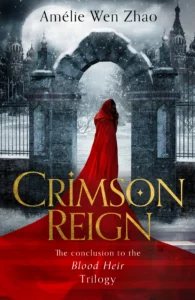Amélie Wen Zhao on writing monstrous main characters
"there is no scenario in which she wouldn’t be considered morally gray or even an antihero"
This post was written by Amélie Wen Zhao, author of Crimson Reign
The era of the traditional divide between Good Hero and Evil Villain has ended; enter the age of the morally gray. In the Blood Heir trilogy, my protagonist Anastacya Mikhailov is at once powerful and terrifying: she has the power to control and manipulate blood. And in a book where she offs a group of guards within the first five chapters in the bloodiest way, there is no scenario in which she wouldn’t be considered morally gray or even an antihero.
So why did I create a princess who is at once monstrous and how do I get the reader to empathize with her and even to root for her?
To craft a compelling character, a writer must dive into their motivations, their background, and why they are doing what they’re doing. Within the first few pages, the reader learns of Ana’s love for her brother, who has been left under the control of a tyrant back in the palace; we learn she is attempting to break a ruthless crime lord out of prison because she believes he can help her save her brother. The road to hell is paved with good intentions, and throughout the book, Ana constantly struggles between balancing her terrible powers with doing what is right. Is bloodshed justified, and how much, if her end goal is to free her empire from a corrupt tyrant?
View this post on Instagram
Likewise, Ramson “Quicktongue” Farrald, the ruthless, backstabbing crime lord, is the definition of a morally-gray character. At the beginning, he is constantly scheming on using Ana for his own gain; he plans to use her powerful Affinity to blood against his rivals in Cyrilia’s underground crime network. Yet as they spend more time together, bickering and fighting and learning from each other, Ramson falls for Ana—for her unwavering sense of justice and determination to see the light in a world of darkness. He begins to doubt his own plan and question whether his life’s purpose should be to continue contributing to the atrocious deeds of Cyrilia’s criminal network.
Both Ana and Ramson share a redeeming factor: they are fighting their inner demons toward goodness. And this is the part of a character’s journey we find most compelling—their internal conflict, their struggle between the light and the dark, and the question of what they will choose in the end. We as readers love this … because we see it in ourselves and all around us. As we grow up, we start to realize the world we live in isn’t perfectly good nor perfectly bad, and neither are most people; we all exist in different shades of gray, with our imperfections. Similarly, Ana and Ramson are characters who have witnessed the worst of this world: one feared and hated since birth for her monstrous powers, the other forced into crime at a young age in order to survive a cutthroat world. They come to us broken and bruised, yet through their journey together they begin to heal, to recognize the darkness in themselves yet work toward a better future. They are a reflection of us as humans and what we hope to be: knowing that the world is full of shadows yet continuing, against all odds, to fight for the slivers of light.
 Get your copy of Crimson Reign by Amélie Wen Zhao here.
Get your copy of Crimson Reign by Amélie Wen Zhao here.


